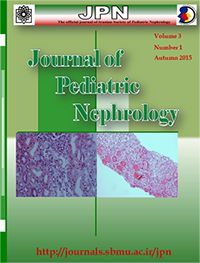Emotional Disorders in Pediatric Renal Transplant Recipients: A Comparative Study
Journal of Pediatric Nephrology,
Vol. 3 No. 1 (2015),
10 Dey 2015
,
Page 13-15
https://doi.org/10.22037/jpn.v3i1.7717
Abstract
Introduction: Kidney transplantation is recognized as the optimal therapy for children with ESRD. We performed this study to compare the children’s behavioral problems and their parents’ function in pediatric patients with Kidney transplantation in Arak Amir Kabir Hospital.
Materials and Methods: To perform this case-control study, we recruited 29 children with renal transplantation and compared them with 29 healthy children aged 5-14 years old. The Child Behavior Checklist (CBCL4/18) was used for the assessment of the children’s behavioral problems and Global Assessment of functioning (GAF) was employed for the evaluation of their parents’ behaviors.
Results: Among 29 patients with RTR, anxiety/depression, somatic complaints, social problems, and attention problem were demonstrated in 65.5%, 55.1%, 51.7%, and 76%, respectively. We found a significant difference between cases and controls. Delinquent and aggressive behavior was not seen in two groups. As a significant difference, the parents’ mean stress and behavior score in case and control groups was 22.4% and 63.1%, respectively.
Conclusions: The higher prevalence of behavioral problems in the renal transplant recipients and their parent’s functional impairment highlights the importance of early parental intervention for early prevention of future behavioral problems in their siblings.
Keywords: Emotional Disturbances; Renal Transplantation, Child.
How to Cite
References
Yousefichaijan P, Salehi B, Rafiei M, Firouzifar MR, Mousavinejad SA. Parents function and behavioral disorders in children with/ without diurnal voiding dysfunction: A comparative study. ZJRMS, 2013; 15.
Yousefichaijan P, Soltani P, Haghverdi F, et al. Parents function and behavioral disorders in children with and without renal transplant recipient’s: A comparative study. Experimental and clinical transplantation 2014;12 supplement 2:180.
Kovacs AZ, Molnar MZ, Szeifert L, et al. Sleep disorders, depressive symptoms and health-related quality of life: a cross-sectional comparison between kidney transplant recipients and waitlisted patients on maintenance dialysis. Nephrol Dial Transplant. 2011; 26(3):1058-65.
Chilcot J, Spencer BW, Maple H, Mamode N. Depression and kidney transplantation. Transplantation 2014;15; 97(7):717-20.
Mathet F1, Martin-Guehl C, Maurice-Tison S, Bouvard MP. Prevalence of depressive disorders in children and adolescents attending primary care. A survey with the Aquitaine Sentinelle Network. Encephale. 2003; 29(5):391-400.
Van Hoebeke E, Hoebeke P, Braet C, Walle JV. An assessment of internalizing problems in children with enuresis. J Urol 2004; 171(2-6) 2580-3.
Kodman –Jones C, Hawkins L, Schulman SL. Behavioral characteristics of children with daytime wetting. J Urol 2001; 166(6): 2392-95.
Von Gontard A, Lettgen B, Olbing H, et al. Behavioral problem in children with urge incontinency and voiding postponement: A comparison of a pediatric and children psychiatric sample. Br J Urol 1998; 81 suppl 3: 100-6.
Joinson C, Heron J, Emond A, Bulter R. Psychological problems in children with bedwetting and combined wetting : A UK population-based study. J Pediatr Psychology 2007; 32 (5):605-16.
De Bruyne E , Van Hoecke E , Van Gompel K , et al .Problem behavior , parental stress and enuresis. J Urol 2009;182 (4):2915-20.
Vásquez V, Novarro N, Valdés RA, Britton GB. Factors associated to depression in renal transplant recipients in Panama. Indian J Psychiatry 2013; 55(3):273-8.
Novak M, Molnar MZ, Szeifert L, et al. Depressive symptoms and mortality in patients after kidney transplantation: a prospective prevalent cohort study. Psychosom Med 2010; 72(6):527-34.
- Abstract Viewed: 238 times
- PDF Downloaded: 168 times

